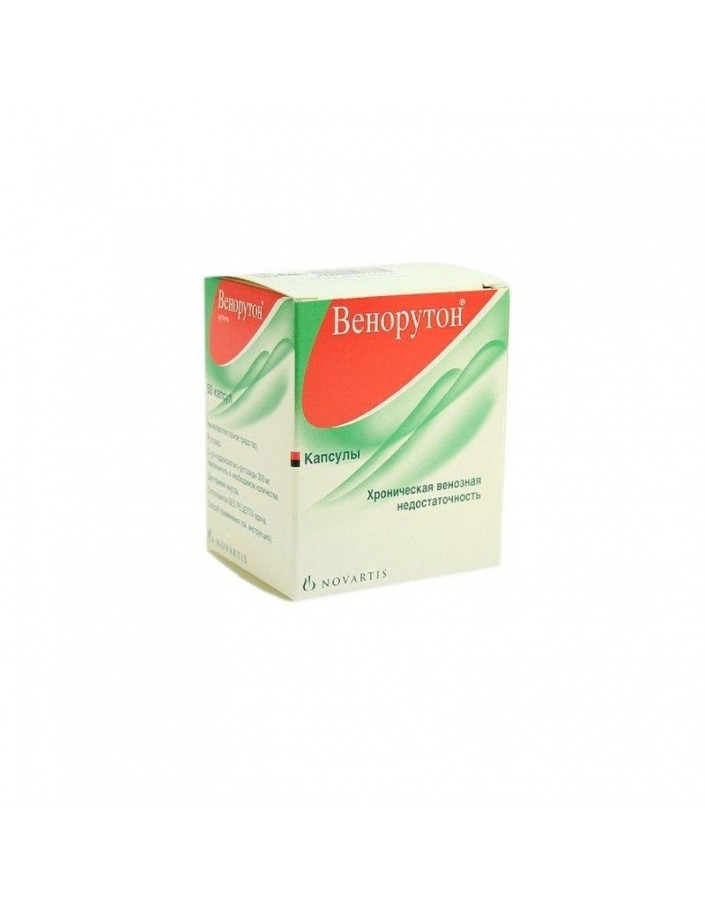




Security policy (edit with Customer reassurance module)

Delivery policy (edit with Customer reassurance module)

Return policy (edit with Customer reassurance module)
|
Venoruton - venotonic and angioprotective drug. It helps to strengthen the walls of capillaries, normalizes their permeability, improves microcirculation. Reduces the severity of symptoms of chronic venous insufficiency (edema, convulsions, paresthesia, trophic disorders), hemorrhoids (pain, exudation); some phenomena that occur during radiation therapy. It helps to slow down the development of retinopathy in patients with diabetes mellitus, arterial hypertension and atherosclerosis. Mechanism of action Pharmacokinetics After oral administration, the absorption of oxerutin (14C-0- (b-hydroxyethyl) -rustozidov / is about 10-15%. The maximum concentration (Cmax) in plasma is achieved within 1-9 hours. For 120 hours, the oxerutin concentration remains detectable; its decrease occurs biexponentially. The half-life (T1 / 2) varies from 10 to 25 hours. It is excreted unchanged and in the form of glucuronized metabolites mainly with bile; 3-6% excreted by the kidneys within 48 hours. Indications and usageVenoruton for oral administration:
Chronic venous insufficiency, varicose veins, hemorrhoids. At the initial stage of treatment, Venoruton is prescribed 300 mg (1 capsule) 3 times a day, or 500 mg (1 pill forte) 2 times a day, or 1000 mg (1 effervescent tablet) 1 time per day; while eating. Reducing symptoms is usually noted within 2 weeks of treatment. It is recommended to continue taking Venoruton in the same dose until the complete disappearance of edema and other symptoms. Then treatment with Venoruton can be interrupted.Improvement usually lasts at least 4 weeks after discontinuation of treatment. When symptoms resume, treatment with Venoruton should be restarted, either with the above doses or with maintenance doses. Maintenance Treatment: The minimum maintenance dose of Venoruton is 600 mg per day, i.e. 300 mg (1 capsule) 2 times a day. Lymphostasis and pain after sclerotherapy and removal of varicose nodes. The recommended dose of Venoruton is 3 g per day - 1000 mg (2 pills forte or 1 effervescent tablet) 3 times per day. Radiation therapy. In order to prevent and treat the side effects of radiation therapy, Venoruton is prescribed 500 mg (1 pill forte) per day with meals. Treatment should continue in the course of radiotherapy and up to the complete disappearance of symptoms. Retinopathy. For the treatment of pathological changes in retinal vessels, doses of 1-2 g per day are successfully applied, i.e. 500-1000 mg (1-2 pills forte or 1 effervescent tablet) 2 times a day. Venoruton Gel (for external use): The gel is applied to the affected area 2 times a day, morning and evening, gently rubbing until completely absorbed. If necessary Venoruton gel can be applied under bandages or elastic stockings. Maintenance dose - 1 time per day for the night. OverdosageNo cases of overdose of Venoruton, which would be accompanied by clinical manifestations, were reported. Contraindications
Pregnancy and breastfeedingIn clinical studies, the use of Venoruton during pregnancy was studied, but its use in the first trimester has not been specifically studied. In studies conducted in animals, no teratogenic or any other undesirable effects on the fetus were noted. Taking into account all the above, as well as guided by the rules adopted in clinical practice, the appointment of Venoruton inside is recommended only from the 4th month (from the second trimester) of pregnancy and only with absolute indications. Traces of ruthoside detected in fetal tissues and breast milk (experimental animal studies) are not considered clinically significant. On the part of the digestive system: if taken orally, mild dyspeptic disorders (nausea, diarrhea, heartburn) are possible. If during the period of application of Venoruton, the severity of symptoms of the disease does not decrease, you should consult with your doctor. The action of Venoruton is enhanced while taking Ascorbic acid . Store in a dry place out of the reach of children, at room temperature (not exceeding 30 ° C). |